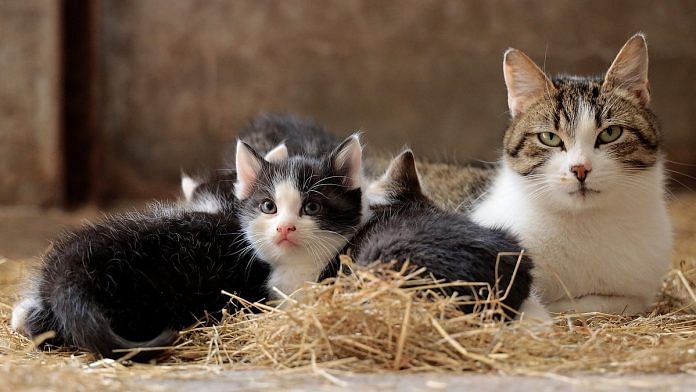New Delhi: Of 600 million domestic cats in the world, 80 per cent are stray, which carry the threat of transmission of infectious diseases and prey on birds and small mammals. To keep their numbers in check, researchers, in a first, may have discovered a non-surgical, single-dose gene therapy that could prevent cats from getting pregnant for at least two years.
The study was published on 6 June in the peer-reviewed journal Nature Communications.
Researchers found that after a single intramuscular injection of contraceptive — Adeno-Associated Virus serotype 9 vector, also known as AAV9 — a naturally occurring hormone called the anti-Müllerian hormone (AMH) was released in female cats which prevented ovulation and conception by blocking the development of egg follicles in the ovaries.
AMH is a non-steroidal hormone produced by the reproductive tissues in human females and other mammals, and also in the testes of males. This hormone essentially plays a key role in developing a baby’s sex organs while it is in the womb. A vector, meanwhile, is part of a group of viruses that may be designed to carry DNA to target cells.
The study was conducted by a team of researchers from the US-based Massachusetts General Hospital, the Center for Conservation and Research of Endangered Wildlife (CREW) at the Cincinnati Zoo and Botanical Garden, and the Horae Gene Therapy Center at the University of Massachusetts Medical School. The researchers received funding from The Michelson Found Animals Foundation, which is offering a $25 million prize to scientists to develop a single-treatment, non-surgical sterilisation method for cats and dogs.
“These (stray) cats typically experience suboptimal welfare and inflict high levels of predation on wildlife. Additionally, euthanasia of healthy animals in overpopulated shelters raises ethical considerations. While surgical sterilisation is the mainstay of pet population control, there is a need for efficient, safe, and cost-effective permanent contraception alternatives,” the researchers wrote, highlighting the objective of their study.
The only other alternative to control the stray population is by surgically removing an animal’s reproductive organs or neutering.
The lead author of the study, Dr. David Pépin — an associate professor at Harvard Medical School and molecular biologist at Massachusetts General Hospital in Boston — was originally looking into AMH as a potential therapy for ovarian cancer but decided later to observe at its effect on ovaries. When he injected the hormone into mice, their ovaries shrunk to newborn size, suggesting AMH might have contraceptive properties.
The researchers previously demonstrated how, more than normal levels of AMH, resulting from gene therapy, can suppress the formation of follicles in adult female mice and induce permanent contraception.
Also Read: How a mating call led Indian & German scientists to new green tree frog species in Arunachal
The study
Researchers found that the gene therapy mechanism of contraception is different from other hormonal contraceptives as it targets follicle development within the ovaries in the early stages. It takes about a year for a follicle to mature before ovulation.
On the other hand, other contraceptives prevent pregnancy by blocking the release of eggs from the ovaries and thinning the lining of the uterus to help keep sperm from reaching the egg.
Since a female mammal’s ovarian follicles produce AMH when she attains adulthood, measuring the levels of AMH in the blood provides a way of estimating ovarian reserve, or the capacity of the ovary to provide egg cells in a female mammal.
A female mammal is born with all the eggs that she will ever have — which is about two million at birth but decreases with time.
For the study, scientists worked with nine female cats, of which three were a control group that received no treatment and six received the injections. The cats were monitored for two years post treatment, and most of them did not develop any side effects — no signs of pain, increase in body temperature, or tissue mass formations were recorded.
For two years, researchers measured the hormone levels in the urine and faeces of these six cats three times a week and discovered higher levels of the AMH hormone.
Two mating trials — 8 months and then 20 months after the treatment — were also conducted. The males were housed with the nine females for 8 hours a day, 5 days a week.
During both trials, the cats in the control group conceived and gave birth to kittens, while the cats in the experimental group did not give birth in either trial.
“These data also suggest that AMH can suppress luteal phases and ovulation without compromising estrogen levels and its effect on healthy longevity, which is an important consideration for long-term uses of AMH as contraceptives in women,” researchers added.
The luteal phase comes after ovulation when the body releases progesterone and some estrogen. Progesterone thickens the lining of the uterus so that a fertilised egg can implant.
While the sample size of the cats was small enough to conduct in-depth observations, additional studies on a larger number of cats are still needed to confirm these results.
It is unlikely that this could be a permanent therapy for humans, however, researchers were quoted saying by The New York Times that it is the “perfect tool” to control cat overpopulation.
Scientists now plan to conduct larger studies to test the therapy in kittens and dogs.
(Edited by Anumeha Saxena)



